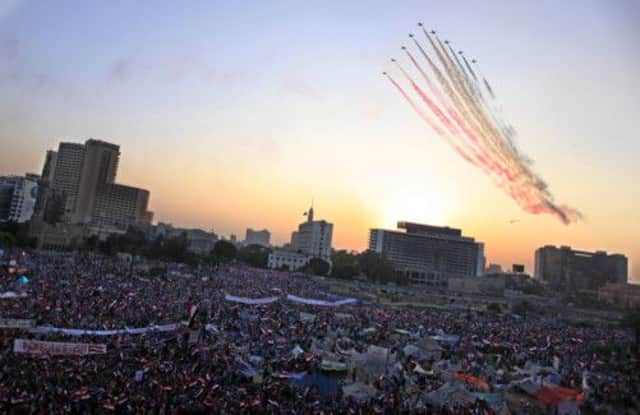Egypt: Morsi ousted after he laughed at warnings


Senior generals have revealed that the final spur of Mr Morsi’s fall from power came on 26 June. On that day top generals met Mr Morsi, telling the Islamist leader what he should say in a major speech he planned as protests against him intensified around the country.
“We told him it has to be short, respond to opposition demands to form a coalition government, amend the constitution and set a timeframe for the two actions,” an officer present in the room said. “Yet he came out with a very long speech that said nothing. That is when we knew he had no intention of fixing the situation, and we had to prepare for Plan B.”
Advertisement
Hide AdAdvertisement
Hide AdAs tensions rose over the following days, Mr Morsi remained defiant. In a final telephone conversation with armed forces commander General Abdel Fattah al-Sisi on Wednesday, the president laughed and made light of mass demonstrations against him, a military source said.
“He just didn’t believe what was going on,” the source added. Any hope that Mr Morsi would call a referendum on his own future or go quietly, had evaporated.
Soon afterwards, as millions took to the streets, the military executed its plan, confining Mr Morsi as a prisoner in his own Republican Guard compound, arresting key supporters in his Muslim Brotherhood and seizing control of parts of the media. Thus ended the first attempt to graft political Islam and democracy onto the Arab world’s most populous and historically powerful state.
Soon after he was elected in June 2012 with 51.7 per cent of the vote, Mr Morsi ordered Egypt’s two top generals to retire; one was Field Marshal Hussein Tantawi, a veteran who had served Hosni Mubarak for 20 years. It seemed a significant break with the past.
Mr Morsi’s choice as the new head of the army was Gen Sisi, 58, a career infantry officer.
But relations between the president and his new generals deteriorated within months. Even Mr Morsi’s apparent success in brokering a ceasefire between Israel and the Hamas Islamist movement that runs the Gaza Strip irked the military.
“Morsi’s intervention in the Gaza war made Egypt guarantee that Hamas would not carry out attacks on Israel. Which threatens Egyptian national security, because what if Hamas did? It could prompt Israel to retaliate against us,” the security source said.
Mr Morsi also talked loosely about possible Egyptian participation in a jihad to overthrow Syria’s president Bashar al-Assad, and raised the prospect of military action over a Nile River dam in Ethiopia. As a result, distrust of him grew.
Advertisement
Hide AdAdvertisement
Hide Ad“It reached a point where we began to be worried about putting important national security reports in front of someone we perceived as a threat to national security,” the security source said.
The day after the 30 June protests, Gen Sisi issued a 48-hour ultimatum to Mr Morsi: either yield to the protesters’ demands that he share power with the opposition, or make way for the military to impose a solution. In two private meetings with the president on 1 and 2 of July the armed forces chief was even more blunt with the president, but met with incomprehension and rejection.
“General Sisi went to him and told us when he came back, ‘He was in denial, he said the protesters are just 130,000 to 160,000, but I told him, ‘No, sir, they are far more than that and you must listen to their demands,’’ the source said.
In a second meeting, the military presented a video to Mr Morsi, to show him the true scale of the protests.
At around 7pm last Wednesday, Gen Sisi called Mr Morsi at his office and asked him one last time if he would agree to a referendum on his continuation in office or to hand over to the speaker of parliament, the source said. The president demurred and the general told him he was no longer president.